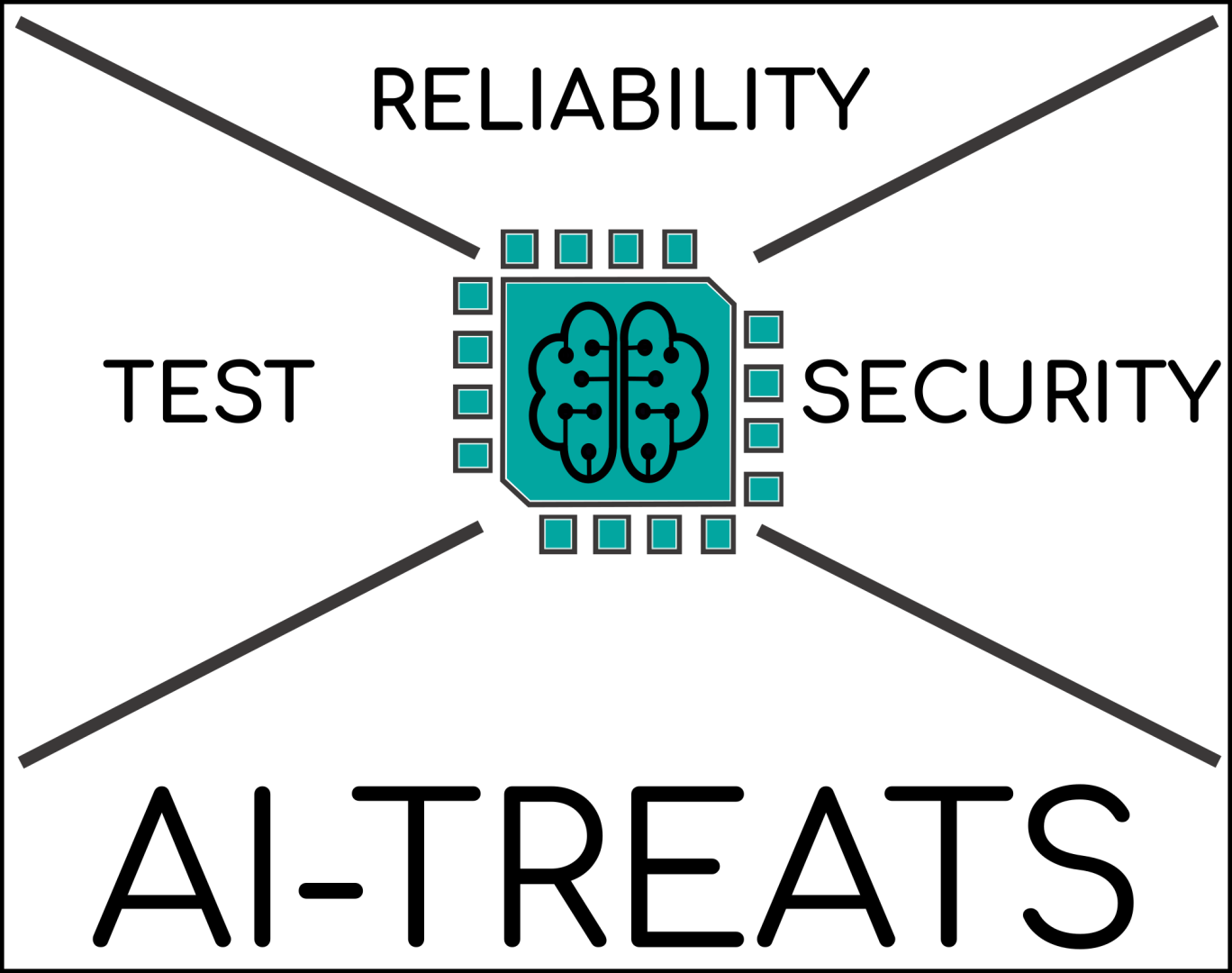All times are CET
Thursday, May 29, 2025
| Opening 16:30-16:45 Annachiara Ruospo (Politecnico di Torino, Italy) Theofilos Spyrou (Delft University of Technology, NL) |
| Session 1: AI Security and Privacy 16:45-17:30 CONV++: Uncovering Privacy Vulnerabilities through Analytical Gradient Inversion Attacks Tamer Ahmed Eltaras1, Qutaibah Malluhi2, Alessandro Savino1, Stefano Di Carlo1 and Adnan Qayyum3 1 Politecnico di Torino, Italy 2 Qatar University, Qatar 3 Information Technology University, Pakistan Input-Triggered Hardware Trojan Attack on Spiking Neural Networks Spyridon Raptis1, Paul Kling1, Ioannis Kaskampas1, Ihsen Alouani2 and Haralampos-G. Stratigopoulos1 1 Sorbonne Université, CNRS, LIP6, France 2 CSIT, Queen’s University Belfast, UK |
| Anniversary Panel 17:30-18:30 AI-TREATS 5th anniversary panel: Lessons learned after nearly one decade of research Moderator: Alberto Bosio (Ecole Centrale De Lyon, France) Panelists: – Elena-Ioana Vatajelu (TIMA – INPG, France) – Haralampos Stratigopoulos (Sorbonne Université, CNRS, LIP6, FR) – Maksim Jenihhin (TalTech – Tallinn University of Technology, Estonia) – Said Hamdioui (Delft University of Technology, The Netherlands) |
| Welcome Reception 18:30 |
Friday, May 30, 2025
| Keynote (in conjuction with eARTS) 9:00-10:00 Speaker: Paolo Rech (University of Trento, Italy) “Is AI Becoming a Good Driver? Reliability Issues in Artificial Neural Networks and Potential Solutions for Autonomous Vehicles” Abstract: Driverless cars are the new trend in the automotive market and, to burst deep space exploration, NASA and ESA are willing to add self-driving capabilities to their rovers. Ingenuity, landed in Mars in 2021, is the first autonomous vehicle to move outside of the Earth. To be implemented, a self-driving system needs to analyze a huge amount of images and signals in real time. This is achieved thanks to Convolutional Neural Networks (CNNs) executed on Graphics Processing Units (GPUs), dedicated accelerators implemented in Field Programmable Gate Arrays (FPGAs) or in Application Specific Integrated Circuits (ASICs), such as the Google’s Tensor Processing Unit (TPU), or even in emerging architectures such as Processing In Memory (PIM) or Neuromorphic devices. In the talk, after a brief description of radiation effects at physical level, we will investigate the reliability of modern and emerging computing architectures executing neural networks, we will show if and why a neutron-induced corruption can modify the autonomous vehicles behaviors, and discuss the implications of these corruptions for the adoption of self-driving vehicles in large scale. The evaluation, to be accurate and precise, is based on the combination of beam experiments and fault injection at different levels of abstractions (RTL, microarchitectural, and software). This combination allows us to have a realistic evaluation of the error rate, distinguish between tolerable errors and critical errors, and to design efficient and effective hardening solutions for neural networks. Exploiting the potential of machine learning and taking full advantage of the computing resources in modern accelerators it is possible to significantly improve the neural network reliability with nearly-zero overhead. Bio: Paolo Rech received his master and Ph.D. degrees from Padova University, Padova, Italy, in 2006 and 2009, respectively. He was then a Post Doc at LIRMM in Montpellier, France. Since 2022 Paolo is an associate professor at Università di Trento, in Italy and since 2012 he is an associate professor at UFRGS in Brazil. He is the 2019 Rosen Scholar Fellow at the Los Alamos National Laboratory, he received the 2024 Italy-Canada innovation award, the 2020 impact in society award from the Rutherford Appleton Laboratory, UK and the Marie Curie Fellowship at Politecnico di Torino, in Italy. His main research interests include the evaluation and mitigation of radiation-induced effects in autonomous vehicles for automotive applications and space exploration, in large-scale HPC centers, and quantum computers. |
| Coffee Break 10:00 – 10:30 |
| Session 2: AI Accelerators and Design of SNNs 10:30-11:30 IR Drop-Resilient Memristor-Based Artificial Intelligence Accelerator Design Emmanouil Arapidis1, Theofilos Spyrou1, Said Hamdioui1 and Anteneh Gebregiorgis1 1 Delft University of Technology, The Netherlands EAR – Endurance-Aware Retraining for Efficient DNN Inference on FeFET-Based Accelerators Changhao Wang1, Nicolò Bellarmino1, Nima Kolahimahmoudi1, Hanzhi Xun2, Danyang Chen3, Sicong Yuan2, Xiuyan Li3, Lin Wang3, Giovanni Squillero1, Mottaqiallah Taouil2, Moritz Fieback2, Said Hamdioui2, Alberto Bosio4 and Riccardo Cantoro1 1 Politecnico di Torino, Italy 2 Delft University of Technology, The Netherlands 3 Shanghai Jiao Tong University, China 4 Ecole Centrale de Lyon, France Design and Variability Analysis of Spiking Neural Networks with Spintronic Synapses Salah Daddinounou1 and Elena Ioana Vatajelu1 1 TIMA – INPG, France |
| Invited Talk 11:30 – 12:00 Speaker: Leticia Maria Bolzani Pohls (Group Leader “Neuromorphic Hardware”, IHP, Germany) Title: Reliability Assessment: Challenges when Adopting Emerging Technology-Based NNs |
| Lunch break 12:00 – 13:30 |
| Session 3: Reliability Assessment and Enhancement of DNNs 13:30 – 15:10 Benchmark Suite for Resilience Assessment of Deep Learning Models Alberto Bosio1, Cristiana Bolchini2, Luca Cassano2, Antonio Miele2, Salvatore Pappalardo1, Dario Passarello2, Annachiara Ruospo3, Ernesto Sanchez3, Matteo Sonza Reorda3 and Vittorio Turco3 1 Ecole Centrale de Lyon, France 2 Politecnico di Milano, Italy 3 Politecnico di Torino, Italy Metrics for Fault Detection in Image Segmentation DNNs Vittorio Turco1, Lorenzo Fezza1, Annachiara Ruospo1, Ernesto Sanchez1 and Matteo Sonza Reorda1 1 Politecnico di Torino, Italy Observations and Challenges on the Vulnerability Assessment of Dynamic Early-Exit Neural Networks Georgios Konstantinidis1, Maria Michael1 and Theocharis Theocharides1 1 University of Cyprus/KIOS Research and Innovation Centre of Excellence, Cyprus DEAR-CNN: Data-Efficient Assessment of Resiliency in Convolutional Neural Networks Nicolò Bellarmino1, Alberto Bosio2, Riccardo Cantoro1, Annachiara Ruospo1 and Ernesto Sanchez1 1 Politecnico di Torino, Italy 2 Ecole Centrale de Lyon, France Open-Source Tools for Reliability Assessment and Enhancement of Deep Neural Networks Mohammad Hasan Ahmadilivani1, Seyed Hamidreza Mousavi1, Jaan Raik1, Masoud Daneshtalab1, Maksim Jenihhin1 1 Tallinn University of Technology, Estonia |
| Closing Session 15:10 – 15:15 |
| Coffee Break 15:15 – 15:30 |
